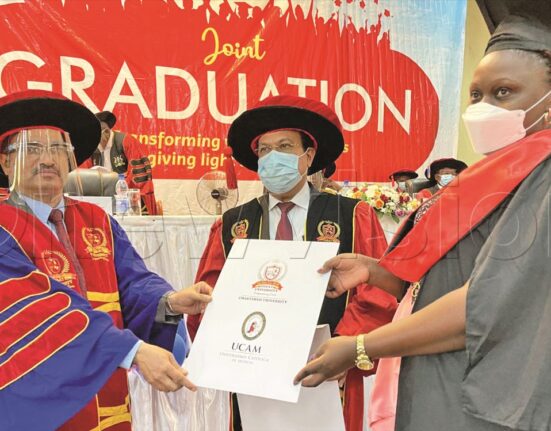This article was first published in the New Vision on May 5, 2021
By Conan Busingye
Universities need to invest heavily in research if they are to be of great value to their communities and the country.
The 2010 State of Higher Education in Uganda report states that: “Research is the major occupation of an academic institution of higher learning especially a university. A university that does not conduct research is no better than a high school.”
“While a high school is required to teach, universities are required to teach, produce, and disseminate knowledge,” the report states.
“We must drive our universities to a level that they can be known for their ability to put out great research which serves the country. All the world’s greatest universities, are the spotlights for their countries, because of research. Think of Oxford University, Cambridge University, Massachusetts Institute of Technology and the rest; they get all this credit from research,” says Prof. Mondo Kagonyera.
This was in his remarks, as he officiated Kampala University’s 17th graduation recently; which was graced by the Kyabazinga of Busoga, William Wilberforce Kadhumbula Gabula Nadiope IV.
The Kyabazinga cautioned students on being focused, and “ensuring that that they do study and do research which benefits the country.”
On the sidelines of that graduation ceremony, Prof. Badru Kateregga said: “All universities need more funds from the government to boost their internal resources which we are investing in research.”
“Funding research is an expensive venture and experience has shown that we have continuously increased funds to research every year. We are doing our best to ensure that the research we do, is a response to the needs of the communities,” Kateregga said.
“Unfortunately, many universities are struggling with low funding for research, and this weakens their ability to produce the desired quality of graduates,” says Kagonyera.
Kagonyera and Kateregga’s remarks are confirmed by the Visitation Committee Report in Universities and the recommendations that are in the pipeline by the education ministry, to table before the Cabinet, that there is need for more investment in universities’ research work.
The recommendations are in a White Paper, submitted recently to the First Lady and education minister, by a team of government experts led by Prof. Frederick Kayanja They were assigned by Government, a couple of years ago, to write the final report, based on earlier reports and findings on higher education.
This move, probably, partly explains why the Government wants some public universities like Makerere, to focus more on postgraduates, as a way of boosting research and innovation in higher institutions of learning.
It adds: “Clear criteria for accessing the research funds should be developed by relevant authorities in line with national policies and development priorities.”
The state minister for higher education, Dr. John Chrysostom Muyingo, confirms that the commission proposes that the government should allocate to universities 1% of its Gross Domestic Product to fund research and development in line with the Africa Agenda 2063 and the Science, Technology, and Innovation Strategy for Africa 2024. Considering that the country’s GDP in 2019 was $28.51b, it would mean that the research fund, if allocated what the Government experts have proposed, would get sh1.049 trillion.

Studies have shown that the country currently spends just 0.3% of the GDP on higher education, while regional counterparts Kenya and Tanzania stand at 0.9% and 1.0% respectively.
Countries like Ethiopia are already investing heavily in university research and development in Africa. Ethiopia’s science and technology policy might be considered as the first expression of the Government’s commitment to spend about 1.5% of the country’s GDP on research and development. Agenda 2063 is Africa’s blueprint and master plan for transforming the continent into the global powerhouse of the future. The Science, Technology, and Innovation Strategy for Africa 2024 is built on four pillars. These include: building and/or upgrading research infrastructures; enhancing professional and technical competencies; promoting entrepreneurship and innovation; and providing an enabling environment for STI development in the African continent.
Reality of Funding
The Government about five years ago began to fund research, after its withdrawal from funding it for a period of almost 10 years. The education ministry data shows that government allocates around sh1.5b every financial year to all public universities, to do research. On the other hand, the National Council of Higher Education (NCHE) requires each private university in Uganda to allocate 10% of their annual budgets to research; but it says this is never done.
The NCHE also notes that on average, more than 75% of the private universities’ budgets are funded through tuition fees. “The tuition fees are directly proportional to levels of enrolment. If this trend continues, the future survival of private institutions remains bleak should there be a fall in the numbers of students enrolled.” This means that most universities cannot depend on their tuition fees to do research.
The NCHE’s executive director Prof. Mary Okwakol says there is a need for both public and private universities to diversify their sources of income to cope with increasing demand for higher education inputs and facilities.
The statistics from the 2015/2016 State of Higher Education report in Uganda show that, on average, 55.7% of budget expenditure goes to staff emoluments in public universities, which on average is higher than 48.4% allocation for private universities.
However, the current challenges facing institutions are leading them to offer predominantly non-science-based programmes in arts, social sciences, and business where the costs involved are for the most part limited to instructor salaries.
The NCHE study also notes that the solution lies in providing more resources to Makerere, which accounts for over 60% of all bachelor’s level graduates in Uganda and holds a central position in any plans for the expansion of scientific research in Ugandan universities, and making changes that make it easier for institutions to raise funds on their own.









Leave feedback about this